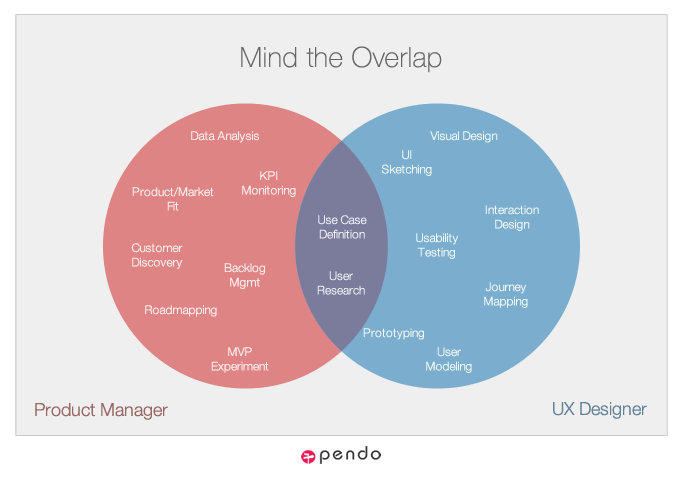How exactly do product manager and UX designer collaborate?
What’s the difference between a UX designer and a product manager? When both roles are on the team, they often wonder where each other’s responsibilities start and end.

I’m writing this from a UX perspective, but sometimes a professional may start in one role and work in the other. Some job duties overlap. It’s common to meet a product manager that started as a UXer or vice versa. When I compare these roles, I see clear-cut responsibilities. For example, a Product Manager has typically led prioritising feature requests.
Let’s examine why they are the perfect match for the product team. Then, some responsibilities are murky. Who makes personas? Who owns User Research? I’ve seen it at one company as the PM, another UX, and another Marketing—the same story.
In practice, there’s quite a bit of overlap between these two roles. This can cause friction for some, but under the right conditions, having both product managers and UX designers on the same team creates some of the most successful products and services.
People in each of these roles often come from various backgrounds. On the one hand, you have UX from graphic design, art, or even business and technology backgrounds. Product managers also come from multiple experiences, such as business or technology; in fact, many UX designers end up moving into product management!
If you read different job descriptions, you’ll start to see a lot of overlap in significant responsibilities:

It's not about roles; it's about skills.
I've found that defining roles matters less than how a company operates.
Highly collaborative teams have Product Managers and UX Designers assigning each other tasks based on what they need for the project. Whoever is best suited at that moment to do it does it. Sometimes the UX Designer might be doing research; other times, the PM, and hopefully, they will work on it more often. Everyone can move forward without feeling territorial.
We must realise that both Product Managers and UX Designers are essential, but they can make decisions together. If these two roles do not share responsibilities, you will have a disconnect between your team and product.
Product Management with no User Experience Design creates functional products that don’t make users excited. User Experience Design with no Product Management produces delightful products that don’t become businesses.
The overlap between UX and product management
A great deal of shared responsibility lies between UX designers and product managers.
Both people focus on solving customer problems through the product they are creating. It brings us to the first point of overlap between the two roles… defining the problem.
UX designers and product managers actively define the problems the product and features are solving for its customers. This work happens most effectively when product managers and UX collaborate.
Product managers are charged with meeting specific business goals through product development. To do this requires defining which problems to solve for customers that will also meet these key business objectives. For UX designers, the overlap occurs when they collaborate with product managers to define further those chosen problems to solve with a deeper understanding of the design and user implications of solving them.
The next area of overlap exists in understanding the product’s customer (or users). Both product managers and user experience designers should conduct and participate in user research. Whether interviews, usability tests or field study observations, each role is critical in learning more about the customers and creating key insights from user research.
Collaborating on a solution is the most significant overlap between UX and PM. Whether creating concepts, journey flows, or prototypes, these roles often work together to paint a picture of the solution for the customer. From there, iterating on that solution in the early stages or even post-launch is another shared responsibility between both roles.

User experience and product management are mutually reliant.
Innovation never occurs in a vacuum.
Making a fantastic product for customers requires a well-functioning team with the correct abilities and a positive dynamic among its members. The success of a product or service depends on the collaboration, communication, and understanding of the product’s creators and management. The most effective product managers appreciate the importance of user experience design, design thinking, and the work of product designers. In contrast, the most effective product designers understand the goals and roles of product managers and always strive for mutually beneficial partnerships.
